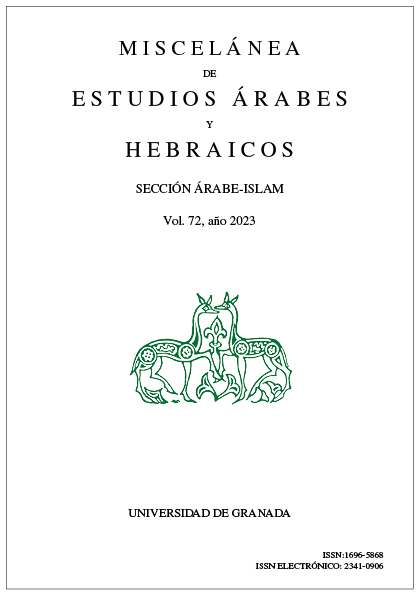Quranic Lexical Semantics of Izutsu and ʻAllāmah Ṭabātabāʼī: a Comparative Appraisal
Semántica léxica coránica de Izutsu y ʻAllāmah Ṭabātabāʼī: una evaluación comparativa
DOI:
https://doi.org/10.30827/meaharabe.v72.22344Palabras clave:
Léxico coránico. Semántica léxica. Izutsu. ʻAllāmah ṬabāṭabāʼīResumen
Este estudio evalúa los principios y métodos de ʻAllāmah Ṭabāṭabāʼī e Izutsu en la semántica de los conceptos coránicos, utilizando un análisis comparativo. Basándose en sus principios semánticos, ʻAllāmah creía en una mayor flexibilidad para el significado de cada palabra en el texto, y esta flexibilidad podría acercarlo a los diversos mensajes incorporados en el texto por las palabras utilizadas por el autor, aunque no utilizó completa-mente esta capacidad en la práctica. Por el contrario, Izutsu hizo hincapié en el principio de que elsignificado de las palabras cambia en relación con la visión cambiante del mundo de los individuos. Aunque este principio facilitó una mejor semántica de los conceptos coránicos, abandonó el significado básico y central de las palabras reemplazando los signifi-cados alternativos y falsos por ellos. Tampoco especificó los principios de la semántica de las oraciones y tenía un método ineficaz para analizar los conflictos en los significados de una palabra en el texto, especialmente en un texto religioso. El principio semántico utilizado por Allāmah parece ser más eficiente para comprender el mensaje real del texto. Por lo tanto, una fusión de su método con los “campos semánticos” de Izutsu será un gran paso para lograr una correcta comprensión de los significados de las palabras coránicas.
Descargas
Citas
ALBAYRAK, Ismail. “The reception of Toshihiko Izutsu’s Quranic studies in the Muslim world”. Journal of Quranic Studies, 14, 1 (2012), pp. 73-106.
BAGHERI AṢL, Ḥiydar. Principles of the Holy Quran. Tabriz: Tabriz University Press, 2012. [in Persian]
IBN AL-ATHĪR, al-Mubārak Ibn Muḥammad al-Shaybānī l-Jazarī. Al-Nihāya fī gharīb al-ḥadit and al-athar. Beirut: Dār-Eḥyā al-Turāth al-ʻArabī, 2001.
IZUTSU, Toshihiko. Ethico-religious concepts in the Quran. McGill-Queen’s University Press, 2002.
—. God and man in the Quran. Islamic Book Trust, 2002.
KHĀKPŪR, Ḥusayn and BULŪRDĪ, Maryam. ‘Chronological semantics of Quranic words in Tafsīr al-Mizan”. Maʻārīf Qurʻānī Research Journal, 21 (2015), pp. 43-67. [in Persian]
LUṬFĪ, Seyyed Mahdī. “Study and critique of Izutsu’s Quranic semantics”. Quranic Linguistic Research, 6 (2014), pp. 37-50. [in Persian]
MALIKĪYĀN, Mustafa. “Introduction”. En Toshihiko IZUTSU. The concept of fait in the Islamic theology. Trad. Zahra Pursina. Teheran: Soroush Publica- tions, 2017, pp.8-12. [in Persian]
MAʻMŪRĪ, Ali. “Linguistic knowledge and its uses in Quranic studies”. The Quran and Science, 1 (2007), pp. 161-176.
MĪRʻAẒĪMĪ, Seyyed Ḥamīd Reza. “Deficiency in explaining religion and ways to reduce it”. Islamic Teachings Association, 23 (2010) pp. 253-274. [in Per- sian]
—. Legislation and explanation of religion in Quran and Sunnah. Tehran: Khānih Tārīkh va Taṣvīr Abrīshamī Publications, 2013. [in Persian]
—; ṢĀLIḤĪ SHĀHRŪDĪ, Afrāsīāb and MASʻŪDĪ, Abdulhādī. “Measuring the efficiency of semantics of Allameh Tabataba’i and Izutsu in the concept of ṣidq”. Religious Research, 37 (2018) pp. 69-94. [in Persian]
MOKHTAR, Omar. Semantics. Trad. Sayaed Hossein Seyedi. Mashhad: Univer- sity of Ferdowsi Publication, 2010. [in Persian]
NOYA, Paul. Quranic interpretation and mystical language. Trad. Ismail Saadat. Teheran: University Publication Center, 1994. [in Persian]
QĀʼIMĪNĪA, Alīriḍā. Cognitive semantics of the Quran. Teheran: Islamic Re- search Institute for Culture and Thought, 2013. [in Persian]
ṢAFAVĪ, Kūrush. An introduction to semantics. Tehran: Soore Mehr Publica- tions, 2008. [in Persian]
SAʻĪDĪ, Rushan and BĀQIR, Muhammad. Analysis of the language of the Quran and the methodology of understanding it. Qom: Research Institute of Hawzeh and University, 2006. [in Persian]
SAʻĪDĪ, Rushan; BĀQIR, Muhammad and SHARĪATĪ, Ghulām Muhammad. “The relationship between linguistic semantics and the interpretation of the Quran by the Quran with emphasis on ʻAllāmah Ṭabāṭabāʼī’s viewpoint”. Quran Studies, 14 (2014), pp. 5-24.
SAJADI, Sayaed Abolfazl and ASHNAVAR, Mahdi. “Semantical comparison of word’s “Alagheh” in the Holy Quran and medicine”. Linguist Research in Holy Quran, 1, 2 (2012), pp. 95-11.
SAJEDI, Abolfazl and SAJEDI, Hamed. “A new analysis of the semantic interac- tion and interpretation of the Quran to the Quran inspired by Izutsu”. Journal of Quran Studies, 2, 17 (2016), pp.11-33. [in Persian]
SHAKŪRĪ, Abulfaẓl. An introduction to the lexical interpretation of Quran. Qom, 2014. [in Persian]
ṬABĀṬABĀʼĪ, Seyyed Muhammad Ḥusayn. Al-Mīzān fī Tafsīr al-Quran. Qom: Society of Seminary Teachers, 1996.
ŪSĪ, Ali Ramaḍān. The method of ʻAllāmah Ṭabāṭabāʼī in Tafsīr al-Mīzān. Trad. Seyyed Ḥusayn Mīrjalīlī. Teheran: Islamic Development Organization, 2002. [in Persian]
VĀʻIZĪ, Aḥmad. Text interpretation theory. Teheran: Research Institute of Isla- mic Seminary and University, 2011.
Descargas
Publicado
Cómo citar
Número
Sección
Licencia
Los autores que publican en esta revista están de acuerdo con los siguientes términos:
1. Los autores conservan los derechos de autor y garantizan a la revista el derecho de ser la primera publicación del trabajo al igual que licenciado bajo una Creative Commons Attribution License que permite a otros compartir el trabajo con un reconocimiento de la autoría del trabajo y la publicación inicial en esta revista.
2. Los autores pueden establecer por separado acuerdos adicionales para la distribución no exclusiva de la versión de la obra publicada en la revista (por ejemplo, situarlo en un repositorio institucional o publicarlo en un libro), con un reconocimiento de su publicación inicial en esta revista.
3. Se permite y se anima a los autores a difundir electrónicamente (por ejemplo, en repositorios institucionales o en su propio sitio web) la versión publicada de sus trabajos (versión post-print del editor) o, en su defecto, el de la versión post-print del autor ya evaluada y aceptada. Esto puede dar lugar a intercambios productivos, así como a una citación más temprana y mayor de los trabajos publicados (Véase The Effect of Open Access).
4. La revista no se hace responsable de las opiniones vertidas por los autores.



















